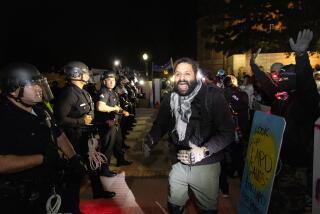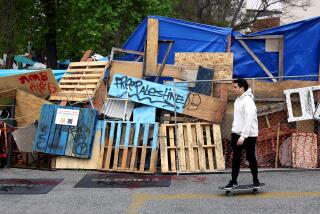Perestroika Prospers at Pepperdine : Joint Soviet-U.S. Projects Bely Campus’s Conservative Image
- Share via
Pepperdine University is becoming a hotbed of U.S.-Soviet cooperation, something that the founder of Western Auto Supply Co. may not have expected when he established the Christian school in 1937.
With the arrival last week of a card-carrying member of the Soviet Communist Party for four months of study at the seaside campus, the hills of Malibu are even more alive with the sound of perestroika.
Vladimir Tyurenkov, 26, who arrived with his wife and 1-year-old son, will be taking classes at Pepperdine and working with senior Scott Talcott to produce a Soviet-American student journal called Montage.
He will join a circle of Pepperdine students and faculty who have devoted themselves to U.S.-Soviet affairs.
Political science professor Dan Caldwell is the newly named head of the Forum for U.S.-Dialogue, a volunteer group that arranges yearly meetings between professionals from both countries.
Writing teacher Anthony Manousos’ collection of short stories and poems is a hit in the Soviet Union, where the book, which he edited with a Soviet colleague, sold 50,000 copies in one month.
And Chancellor Emeritus M. Norvel Young hopes to take part in a Soviet-American writers conference to be held in the Soviet Union later this year.
All this may seem surprising at a campus where attendance is taken at prayers once a week and where students in a psychology class, asked to list deviant traits such as thievery and drug abuse, jokingly included the word Democrat.
“We are strongly Christian, and it’s also correct to say that compared to most other institutions in Southern California, we’re fairly conservative,” said John G. Watson, vice president for student affairs at the Malibu school.
“That does not mean that we want to be blind to having open dialogue about all issues,” he said. “That’s what higher education is all about.”
Founded just over 50 years ago by George Pepperdine, an auto parts tycoon who wanted to train Christian business leaders, the school is linked with the Churches of Christ, a denomination that believes in a literal acceptance of the Bible. It is independently funded, largely by contributions from prominent Republicans.
William H. Rehnquist, now chief justice of the United States, taught law there, and Arthur Laffer, whose famous curve became a symbol of Reaganomics, has also been on the faculty.
But as early as 1985, when memories of President Reagan’s rhetoric about “the evil empire” were still fresh, the university was host to a group of Soviet writers and to delegates from Caldwell’s Forum for U.S.-Soviet Dialogue.
These developments were no surprise to Young, who knew George Pepperdine for many years.
“He felt the truth had nothing to fear from comparison, whether moral, ethical, economic or political,” said Young, who stepped down as president and chancellor five years ago but continues to be active at the university.
“We’re very, shall we say, loyal here to our traditional values, but also very global in our outlook,” he said.
For a college of its size, 2,300 undergraduates, “There’s quite a bit going on,” said Caldwell, who has been on the faculty since 1978.
“I think it partially is coincidental, different activities revolving around different individuals who have taken the initiative; and the other thing is that the administration has been very supportive of those efforts,” he said.
He compared the school’s links with the Soviet Union to his own activities with the Forum, which stages conferences in the United States and the Soviet Union in alternate years.
“Though there is a theoretical case for conservatives saying, ‘you shouldn’t deal with the Soviets,’ I’ve only had positive feedback from the conservative folks involved in (the Forum), and the same applies to the campus,” Caldwell said.
Some of the students may seem more interested in surfing, dating or business careers than in international relations. But when a Soviet debate team appeared at the campus on the night of the final game of the 1988 World Series, students “half-filled the auditorium at the law school,” said Manousos, whose book, “The Human Experience,” has sold about 6,000 copies in the United States.
“That’s when I knew the interest was pretty keen,” he said.
In fact, a 50-day vigil organized by Talcott and several other students in 1988 demanded direct links between Pepperdine and the Soviet Union.
They addressed their appeal for a sister campus and a U.S.-Soviet student newsletter to Soviet leader Mikhail S. Gorbachev, who never actually responded--distracted, perhaps, by the December, 1988, earthquake that devastated Soviet Armenia.
But through his telephone contacts with Soviet students, Talcott came upon Tyurenkov, then a student at the Baumann State Technical University in Moscow.
Learning that Tyurenkov and two other Soviet students were about to come to the United States to visit Cincinnati University, Talcott, a political science major, persuaded the student government at Pepperdine to put up $2,000 for them to visit the Malibu campus for three days last March.
It was in the back seat of a convertible bound for Disneyland that the idea was hatched for Montage, which will appear in English and Russian four times a year.
The editors are looking at stories and artwork from students in both countries. After a final conference in March, the first edition will be printed in the United States, and in May, 40,000 copies will be distributed in each country.
Pepperdine contributed $7,000 worth of computer hardware for the Soviet side of the project that Talcott and co-publisher Susan McKean, a Slavic languages major at Stanford University, took to Moscow in December.
“I think it’s very bold and commendable of Pepperdine that they’re exploring this,” McKean, of Bernardston, Mass., said in a telephone interview from Palo Alto. “They’re trying to get away from the reputation that most people know about Pepperdine.”
The university also advanced the students a $9,000 grubstake to help publish the premiere issue, and granted Tyurenkov a $6,000 scholarship to cover the tuition of his courses in the great books, international relations and American foreign policy.
Like Talcott--who was so busy during his two trips to the Soviet Union that he has not yet seen the Kremlin--Tyurenkov has been in a whirl since arriving in the United States three days before Christmas.
After visiting Talcott’s family at their home in Tacoma, Wash., and at their cabin in Montana, Tyurenkov and his family moved into a borrowed apartment in Malibu Village this week.
“Everyone up north warned us about Southern California,” he said. “It was like the image of America we had for some years in the Soviet Union--dangerous, a very dangerous place to live.”
Tyurenkov, a Communist Party member for five years, was introduced to a different view of America at a meeting of the Malibu Rotary Club on Wednesday.
“It was really unusual because they were such serious people, but they like to relax in a funny way,” he said of the Rotarians, who like to sing and tell jokes at their weekly meetings.
He said it is too early to make any judgments about the Malibu campus, except that “the students are the same as in our country. I don’t mean in faith, but in habits and behavior.”
The only other Christian college he knows is the Russian Orthodox seminary at Zagorsk, a town outside Moscow that goes back to medieval times, where acolytes in beards and robes prepare for lives of religious ritual.
“So it’s very interesting to be here and to understand the differences between our Christian college and here,” he said.
Fer sure, dude.
More to Read
Sign up for Essential California
The most important California stories and recommendations in your inbox every morning.
You may occasionally receive promotional content from the Los Angeles Times.













